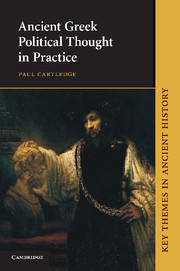Book contents
- Frontmatter
- Contents
- Preface
- Acknowledgements
- Timeline
- CHAPTERS AND NARRATIVES
- 1 Meaning in context: how to write a history of Greek political thought
- 2 The Greek invention of the polis, of politics and of the political
- Narrative I The prehistoric and protohistoric Greek world, c. 1300–750 BCE
- Narrative II The archaic Greek world, c. 750–500 BCE
- Narrative III The classical Greek world I, c. 500–400 BCE
- Narrative IV The classical Greek world II, c. 400–300 BCE
- Narrative V The Hellenistic Greek world, c. 300–30 BCE
- Narrative VI ‘Graecia capta’ (‘Greece conquered’), c. 146 BCE – CE 120
- APPENDIX I Selected texts and documents
- APPENDIX II The ‘Old Oligarch’: a close reading
- Bibliographical essay
- References
- Index
Narrative III - The classical Greek world I, c. 500–400 BCE
Published online by Cambridge University Press: 05 June 2012
- Frontmatter
- Contents
- Preface
- Acknowledgements
- Timeline
- CHAPTERS AND NARRATIVES
- 1 Meaning in context: how to write a history of Greek political thought
- 2 The Greek invention of the polis, of politics and of the political
- Narrative I The prehistoric and protohistoric Greek world, c. 1300–750 BCE
- Narrative II The archaic Greek world, c. 750–500 BCE
- Narrative III The classical Greek world I, c. 500–400 BCE
- Narrative IV The classical Greek world II, c. 400–300 BCE
- Narrative V The Hellenistic Greek world, c. 300–30 BCE
- Narrative VI ‘Graecia capta’ (‘Greece conquered’), c. 146 BCE – CE 120
- APPENDIX I Selected texts and documents
- APPENDIX II The ‘Old Oligarch’: a close reading
- Bibliographical essay
- References
- Index
Summary
Athens was the first Greek, and the world's first, dêmokratia. Most of the rest of the Greek world was at first very slow to catch on to democracy's supposed benefits, however. Indeed, in the eastern Mediterranean at any rate, there was something of a revival of tyranny in the first quarter of the fifth century, inspired by the looming menace of an autocratic Persian empire that preferred to deal, as most empires in history always have, with one or a few loyal supporters in its subject communities rather than with a potentially volatile, even disloyal, crowd. In the far west of Hellas, too, in Sicily, the early fifth century was a great age of family-based dynastic tyranny centred on the two major cities of Gela and Syracuse. There personal tyranny could be backed by a triumphant political argument from military success, since under Gelon of Syracuse the Sicilian Greeks repulsed an attempt by the Phoenicians, colonisers of Carthage and western Sicily, to ‘barbarise’ the entire island.
That success coincided precisely (480–479) with the successful resistance of a handful of loyalist Greek cities to an attempted conquest of mainland Greece by Persia under Great King Xerxes. The leaders of that resistance were, by land and by sea respectively, Sparta and Athens. For Athens, the Graeco-Persian Wars gave a huge boost to the lower orders of ordinary citizens, who (together with some slaves, perhaps) had supplied the muscle power to propel the triple-banked trireme warships (170 rowers in each one) at the victorious naval Battles of Salamis (480) and Mycale (479).
- Type
- Chapter
- Information
- Ancient Greek Political Thought in Practice , pp. 65 - 68Publisher: Cambridge University PressPrint publication year: 2009

